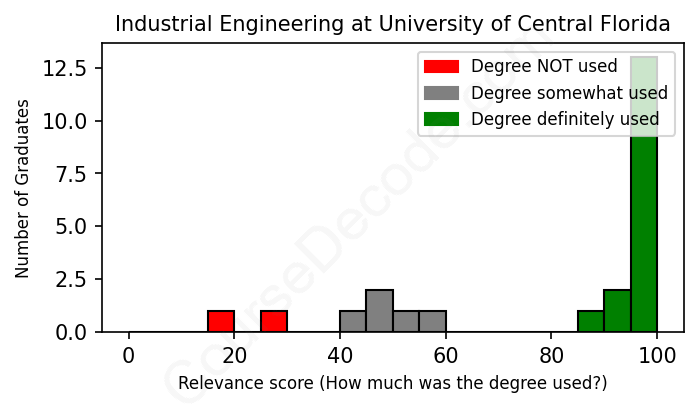
First, some facts. Of the Industrial Engineering graduates from University of Central Florida we've analyzed , here's how many have used (or NOT used) their degree in their career:

These are estimates based on AI analysis of 23 LinkedIn profiles (see below).
The verdict? Significantly above average. Overall, with an average relevance score of 80%, Industrial Engineering graduates from University of Central Florida have a much higher likelihood (+13%) of finding work in this field compared to the average graduate across all fields:
And for comparison, here's the chart for all profiles we've looked at across all degrees.
Also, after graduating, only 26% of these graduates have pursued further education other than another Bachelor's degree (such as a Masters degree or other), compared to the average across all profiles of 35%. This suggests a Bachelors degree is enough for most Industrial Engineering graduates, and it's normal to look for work straight after graduation.
See the details:
|
Relevance score: 43% We think this person has gone into a career only somewhat relevant to their degree. We think this person has gone into a career only somewhat relevant to their degree.
DEGREE INFOGraduated in 2019 from University of Central Florida with a Bachelor's degree in Industrial Engineering. No other secondary education since. JOB HISTORY SINCE GRADUATIONContinuous Improvement Engineer Intern The Coca-Cola Company May 2019 - Aug 2019 Field Application Engineer  OSD Displays Aug 2019 - Mar 2021 Construction Project Manager  PulteGroup Mar 2021 - Jan 2022 Right of Way Permitting Engineer  City of Tampa Feb 2023 - Present ABOUTNo information provided. |
The top 10 most common jobs done by the graduates we've analyzed (ranked most common to least) are:
From analyzing the LinkedIn profiles of graduates from the University of Central Florida who studied Industrial Engineering, a clear trend emerges: many of them have found positions that are directly relevant to their degree. A significant number of graduates are employed at Lockheed Martin in various roles such as Industrial Engineer, Project Engineer, and Manufacturing Supervisor, where they apply their engineering and project management skills in real-world situations. Other common roles include Manufacturing Engineer and Quality Engineer, often focusing on process optimization and quality management—core aspects of Industrial Engineering. Positions within organizations like Boeing and Tesla, where graduates are involved in systems engineering, lean manufacturing, and efficiency improvement, also highlight how the skills developed in their studies are put to practical use.
However, not all jobs align perfectly with Industrial Engineering principles. Some graduates have ventured into fields like education or various roles at companies that don’t fully utilize their engineering expertise, such as Technical Support Specialist or freelance photography. While these positions may employ some transferable skills, they lack a strong connection to the engineering methodologies central to the degree. Overall, it appears that a good portion of UCF Industrial Engineering graduates have successfully landed roles that leverage their education, but there's a notable mix of unrelated positions that highlight the flexibility of their skills. So, if you’re thinking about this degree, know that it can open doors in engineering and beyond, but you might also find yourself in unexpected career paths!
Here is a visual representation of the most common words in job titles for Industrial Engineering graduates (this is across all Industrial Engineering graduates we've analyzed, not just those who went to University of Central Florida):

Graduates from the University of Central Florida with a degree in Industrial Engineering seem to have generally favorable career trajectories, especially when it comes to their early jobs after graduation. Many of them started off working in notable companies, particularly Lockheed Martin, which is a big employer for engineers. For instance, a significant number of graduates took on roles such as Industrial Engineer or various engineering positions at Lockheed Martin right after graduation, often moving up the ladder through promotions and transitions within the company. By the time they hit the 5-year mark, many are in managerial or specialized engineering roles, showcasing a clear pathway to advancement in the engineering field.
However, it's worth noting that not every graduate has taken a direct engineering route. Some have ventured into completely different fields like education or freelance work in media, indicating a mix of experiences among graduates. While the majority of those who stayed in engineering found stable and relevant career paths, others didn't align as closely with their degree. Overall, it appears that the Industrial Engineering graduates from UCF are well-positioned to secure solid, relevant careers, particularly within engineering firms, thanks to the skills they acquired during their studies, but there are also outliers who’ve taken their own unique paths.
Getting a Bachelor’s degree in Industrial Engineering, whether at the University of Central Florida or elsewhere, can be pretty challenging, but it's definitely manageable if you're willing to put in the effort. You'll dive into a mix of math, science, and engineering principles, tackling subjects like optimization, systems modeling, and statistics. The workload can feel heavy at times, especially during midterms and finals, but many students find the projects and collaborative work enjoyable, which makes it easier to stay engaged. Overall, it's not necessarily tougher than other engineering disciplines, but it does require good time management and a solid grasp of math concepts. If you stay organized and reach out for help when you need it, you'll find your groove!
Most commonly, in the LinkedIn profiles we've looked at, it takes people 4 years to finish a Bachelor degree in Industrial Engineering.
From what I can see, it looks like the Industrial Engineering grads from UCF are doing pretty well in their careers, especially those who went into engineering roles at big companies like Lockheed Martin and Boeing. A lot of them have climbed the ladder pretty quickly into managerial positions, which generally comes with decent pay. The ones who took on less traditional paths, like teaching or freelance work, might not be making as much as their engineering counterparts, but it’s not unusual for teachers in certain areas either. Overall, it seems like the engineering grads are likely making solid salaries and building promising careers, while a few others are just carving their own unique paths. So, by both the engineering job market and other fields they’ve chosen, they seem to be in a good spot financially!
Here is a visual representation of the most common words seen in the "about" section of LinkedIn profiles who have a Bachelor degree in Industrial Engineering (this is across all Industrial Engineering graduates we've analyzed, not just those who went to University of Central Florida). This may or may not be useful:

Here are all colleges offering a Bachelor degree in Industrial Engineering (ordered by the average relevance score of their Industrial Engineering graduates, best to worst) where we have analyzed at least 10 of their graduates:
| College | Score | Count |
|---|---|---|
 Iowa State University Iowa State University
|
88 | 11 |
 North Carolina State University North Carolina State University
|
87 | 12 |
 California Polytechnic State University-San Luis Obispo California Polytechnic State University-San Luis Obispo
|
87 | 15 |
 Texas A&M University Texas A&M University
|
83 | 39 |
 Purdue University Purdue University
|
81 | 36 |
 University of Central Florida University of Central Florida
|
80 | 23 |
 Georgia Institute of Technology Georgia Institute of Technology
|
80 | 59 |
 Penn State University Penn State University
|
79 | 16 |
 Texas Tech University Texas Tech University
|
79 | 10 |
 University of Pittsburgh University of Pittsburgh
|
79 | 15 |
 University of Washington University of Washington
|
78 | 12 |
 University of Arkansas University of Arkansas
|
78 | 11 |
 University of Wisconsin-Madison University of Wisconsin-Madison
|
76 | 13 |
 University of Illinois at Urbana-Champaign University of Illinois at Urbana-Champaign
|
73 | 15 |
 West Virginia University West Virginia University
|
71 | 19 |
 Clemson University Clemson University
|
69 | 23 |
 University of Florida University of Florida
|
64 | 11 |